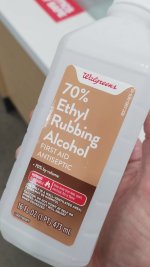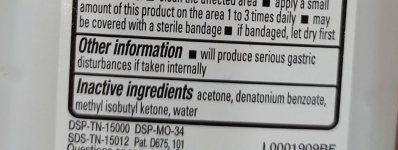Yes. One is 70% and other is 99%. But both will do the job.
Is There a Difference Between Using 70% and 99% Alcohol to Clean Briar Pipes?
- Thread starter tzinc
- Start date
You are using an out of date browser. It may not display this or other websites correctly.
You should upgrade or use an alternative browser.
You should upgrade or use an alternative browser.
SmokingPipes.com Updates
Watch for Updates Twice a Week
Actually I once had a vegan make me some really good sausage that used raw unprocessed tobacco leaf. It was pretty freaking good actually. The fact they're a vegan just makes it all the more entertaining.You eat tobacco??
And by the way the digestive system is the least effective way to absorb nicotine (unless it's in a liquid form).
Not often. After each smoke, you should do rudimentary cleaning. Alcohol should be used maybe monthly or quarterly. Also, be careful with alcohol. It can possibly cause an issue with finish.How often should I use the alcohol? After each smoke once a week once a month? What I have been doing is running a couple pipe cleaners through (non-bristle then bristle) after each smoke.
Most of my pipes are estates. They all get a thorough clean with alcohol on arrival. After that it's a couple of pipecleaners through the stem and shank, then folded over cleaners for the bowl immediately after each smoke.How often should I use the alcohol? After each smoke once a week once a month? What I have been doing is running a couple pipe cleaners through (non-bristle then bristle) after each smoke.
If any of my pipes start smoking sour or funky, I'd give it a thorough hot water flush followed by an alcohol clean, but that rarely happens.
How do you do a hot water flush?Most of my pipes are estates. They all get a thorough clean with alcohol on arrival. After that it's a couple of pipecleaners through the stem and shank, then folded over cleaners for the bowl immediately after each smoke.
If any of my pipes start smoking sour or funky, I'd give it a thorough hot water flush followed by an alcohol clean, but that rarely happens.
Ah, now you may be touching on quite a raw nerve for some of the members here ?How do you do a hot water flush?
Quite a few posts on this subject in the Forums if you do a search.
Essentially you run hot water from a tap into the bowl (gently, rather than a gush) and allow the water to soften and flush out the gunk from the shaft. If the shaft has a lot of accumulated tar, I use a fine bristle brush to "scrape" out as much of the gunk as possible. Then scrunched up paper towels to "ream" out and dry the bowl.
Last edited:
Now that's some information I never would have guessed I would learn on a pipe forum! That's cool!As a biochemist, 70% is far better as aI disinfectant, as it disrupts cell walls and makes bacteria pop, 99% simply dehydrates them.
On a more serious note, the best thing I've found is Everclear. Nothing scientific, just my subjective opinion.
Ah, now you may be touching on quite a raw nerve for some of the members here ?
Quite a few posts on this subject in the Forums if you do a search.
Essentially you run hot water from a tap into the bowl (gently, rather than a gush) and allow the water to soften and flush out the gunk from the shaft. If the shaft has a lot of accumulated tar, I use a fine bristle brush to "scrape" out as much of the gunk as possible. Then scrunched up paper towels to "ream" out and dry the bowl.
The water flush is good if you use it frequently to prevent build up. Once a bunch of crud has accumulated, you need something more to break it down.
Last edited:
I'm also a biochemist/molecular biologist, and have something to add too.
Where it concerns cleaning pipes, you are looking for the appropriate solvent to dissolve and remove the "gunk" in your pipe. This undesirable material fouling your pipe is a heterogenous mixture comprised of molecules of various sizes and physical properties. The key property we're interested in is solubility--how soluble these materials are in a given solvent.
My somewhat thorough approach is to sequentially clean a pipe with the four clean solvents that will evaporate absolutely without fouling your pipe themselves: water, methanol, ethanol, and isopropanol.
Using this assortment of solvents, sequentially, means that you will remove the breadth of pollutants in your pipe with solubilities ranging from "most polar" (e.g. water) to "most non-polar" (e.g. isopropanol).
We can't use completely non-polar hydrocarbon solvents like benzene, toluene, and others (such as complex mixtures like gasoline or kerosene) because they will bind to the briar matrix and not evaporate cleanly.
Finally, I do use a denature ethanol (Home Depot) to clean pipes. The most important thing to note is what the alcohol was denatured with. In this case, it's denatured with a little methanol to make it undrinkable (and change its tax category). Avoid any alcohols that are denatured with "bittering agents" such as Denatonium.
Again, methanol is poisonous to drink, but it (and isopropanol) evaporate cleanly very quickly.
As you apply the different alcohols you will notice a new "flush" of "gunk" being leeched out, representing the groups of tars and other materials that are more soluble in one alcohol versus another.
And yes, there are some types of filth in pipes that are very soluble in plain old water.
Where it concerns cleaning pipes, you are looking for the appropriate solvent to dissolve and remove the "gunk" in your pipe. This undesirable material fouling your pipe is a heterogenous mixture comprised of molecules of various sizes and physical properties. The key property we're interested in is solubility--how soluble these materials are in a given solvent.
My somewhat thorough approach is to sequentially clean a pipe with the four clean solvents that will evaporate absolutely without fouling your pipe themselves: water, methanol, ethanol, and isopropanol.
Using this assortment of solvents, sequentially, means that you will remove the breadth of pollutants in your pipe with solubilities ranging from "most polar" (e.g. water) to "most non-polar" (e.g. isopropanol).
We can't use completely non-polar hydrocarbon solvents like benzene, toluene, and others (such as complex mixtures like gasoline or kerosene) because they will bind to the briar matrix and not evaporate cleanly.
Finally, I do use a denature ethanol (Home Depot) to clean pipes. The most important thing to note is what the alcohol was denatured with. In this case, it's denatured with a little methanol to make it undrinkable (and change its tax category). Avoid any alcohols that are denatured with "bittering agents" such as Denatonium.
Again, methanol is poisonous to drink, but it (and isopropanol) evaporate cleanly very quickly.
As you apply the different alcohols you will notice a new "flush" of "gunk" being leeched out, representing the groups of tars and other materials that are more soluble in one alcohol versus another.
And yes, there are some types of filth in pipes that are very soluble in plain old water.
As for rubbing alcohol having a stench, it will easily evaporate over night if the pipe is left cracked open…. Pretty sure it evaporates closer to gasoline than water, ei faster.
And I was under the impression alcohol was to remove the crud, not to kill bacteria, although I guess that is a side benefit. Pretty sure the smoke will also do that.
And I was under the impression alcohol was to remove the crud, not to kill bacteria, although I guess that is a side benefit. Pretty sure the smoke will also do that.
And, you can drink it. It wasn't half bad with Diet Pepsi.On a more serious note, the best thing I've found is Everclear. Nothing scientific, just my subjective opinion.
Makes sense to me. I use 91% Iso or Everclear, since those are two I have around. And as far as alcohols are concerned, once they have evaporated, they're gone. At least that was always my understanding. And the toxic components of burning tobacco are probably of more concern than any of those solvents...I'm also a biochemist/molecular biologist, and have something to add too.
Where it concerns cleaning pipes, you are looking for the appropriate solvent to dissolve and remove the "gunk" in your pipe. This undesirable material fouling your pipe is a heterogenous mixture comprised of molecules of various sizes and physical properties. The key property we're interested in is solubility--how soluble these materials are in a given solvent.
My somewhat thorough approach is to sequentially clean a pipe with the four clean solvents that will evaporate absolutely without fouling your pipe themselves: water, methanol, ethanol, and isopropanol.
Using this assortment of solvents, sequentially, means that you will remove the breadth of pollutants in your pipe with solubilities ranging from "most polar" (e.g. water) to "most non-polar" (e.g. isopropanol).
We can't use completely non-polar hydrocarbon solvents like benzene, toluene, and others (such as complex mixtures like gasoline or kerosene) because they will bind to the briar matrix and not evaporate cleanly.
Finally, I do use a denature ethanol (Home Depot) to clean pipes. The most important thing to note is what the alcohol was denatured with. In this case, it's denatured with a little methanol to make it undrinkable (and change its tax category). Avoid any alcohols that are denatured with "bittering agents" such as Denatonium.
Again, methanol is poisonous to drink, but it (and isopropanol) evaporate cleanly very quickly.
As you apply the different alcohols you will notice a new "flush" of "gunk" being leeched out, representing the groups of tars and other materials that are more soluble in one alcohol versus another.
And yes, there are some types of filth in pipes that are very soluble in plain old water.
I'm also a biochemist/molecular biologist, and have something to add too.
Where it concerns cleaning pipes, you are looking for the appropriate solvent to dissolve and remove the "gunk" in your pipe. This undesirable material fouling your pipe is a heterogenous mixture comprised of molecules of various sizes and physical properties. The key property we're interested in is solubility--how soluble these materials are in a given solvent.
My somewhat thorough approach is to sequentially clean a pipe with the four clean solvents that will evaporate absolutely without fouling your pipe themselves: water, methanol, ethanol, and isopropanol.
Using this assortment of solvents, sequentially, means that you will remove the breadth of pollutants in your pipe with solubilities ranging from "most polar" (e.g. water) to "most non-polar" (e.g. isopropanol).
We can't use completely non-polar hydrocarbon solvents like benzene, toluene, and others (such as complex mixtures like gasoline or kerosene) because they will bind to the briar matrix and not evaporate cleanly.
Finally, I do use a denature ethanol (Home Depot) to clean pipes. The most important thing to note is what the alcohol was denatured with. In this case, it's denatured with a little methanol to make it undrinkable (and change its tax category). Avoid any alcohols that are denatured with "bittering agents" such as Denatonium.
Again, methanol is poisonous to drink, but it (and isopropanol) evaporate cleanly very quickly.
As you apply the different alcohols you will notice a new "flush" of "gunk" being leeched out, representing the groups of tars and other materials that are more soluble in one alcohol versus another.
And yes, there are some types of filth in pipes that are very soluble in plain old water.

Methanol - Wikipedia
Methanol is nasty stuff, I don't know specifics about how much is ok to use in a work environment but I would never risk using it indoors (not without a professional fume hood).
5% usually. I spray it everywhere, at home and at work (everyone does). What you want to avoid is working in an enclosed, poorly ventilated space with 100% methanol where fumes can accumulate, or avoid prolonged skin exposure to high-percentage methanol. Just like any other solvent, I suppose.I would be curious about how much Methanol is used to commercially de-nature Ethanol.
Methanol - Wikipedia
en.wikipedia.org
Methanol is nasty stuff, I don't know specifics about how much is ok to use in a work environment but I would never risk using it indoors (not without a professional fume hood).
5% usually. I spray it everywhere, at home and at work (everyone does). What you want to avoid is working in an enclosed, poorly ventilated space with 100% methanol where fumes can accumulate, or avoid prolonged skin exposure to high-percentage methanol. Just like any other solvent, I suppose.
While it's nice to hear that it doesn't seem to inhibit the overall usefulness of denatured ethanol, I would probably still avoid it just to make sure no-one confuses the potential uses.

Methanol - Wikipedia
The main point: "Ingesting as little as 10 mL (0.34 US fl oz) of pure methanol can cause permanent blindness by destruction of the optic nerve."
And: " Toxicity effects from repeated over exposure have an accumulative effect on the central nervous system,"
So that means accidentally ingesting as little as 100ml of "Denatured Ethanol" will make you go blind, and that can include accumulated smaller doses over time.
Contrast that with Isopropyl Alcohol: "Unlike methanol or ethylene glycol poisoning, the metabolites of isopropyl alcohol are considerably less toxic, and treatment is largely supportive."
Denaturing Ethanol with Methanol is like putting a loaded gun in a bottle as a "deterrent", personally I would never want any Methanol mixture in my house.
I do have a bottle of pure Methanol for use as a lens cleaner, but to be honest after reading the warnings I've never opened it because I know the handling requirements are so strict I've never bothered to try and make use of it.
I would be curious about how much Methanol is used to commercially de-nature Ethanol.
Methanol - Wikipedia
en.wikipedia.org
Methanol is nasty stuff, I don't know specifics about how much is ok to use in a work environment but I would never risk using it indoors (not without a professional fume hood).
According to the MSDS, it varies between 50-50, 60-40% with methanol being the majority.










